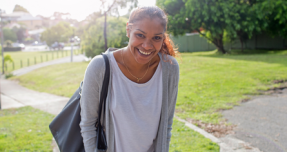Like so many other women, Amara told us she had begun experiencing homelessness due to family violence perpetrated by her husband. She felt she had no other option but to leave the family home to stay safe.
No one should have to make the decision to leave their children with an abusive partner, but Amara was worried about the impacts of homelessness on their wellbeing and the importance of stable housing. She was left with no choice but to leave her three children residing with their father.
Amara came to Juno (then WISHIN) through Vincent Care after she was released from prison for driving on a suspended license. The combined impacts of trauma and experiences of homelessness forced her into circumstances where she had minimal choice. Even though she had lost her license, Amara relied on her car to search for housing and attend appointments.
Amara was experiencing homelessness when she went into prison and had been sleeping rough in her car and couch surfing in the Melbourne area for the past two years. When she left prison, she had nowhere to go. When we met Amara, she resided in a motel and was sharing the cost of her accommodation with Vincent Care.
Her exposure to violence and navigating the homelessness system – and the complex trauma these experiences evoked – impacted Amara’s mental health and created further obstacles she then had to overcome.
She identified that she had previously used methamphetamine in an attempt to cope with the psychological distress. The impacts of and discrimination around mental health issues, drug use or experiences of incarceration produce further barriers that make it harder for women to access and maintain secure housing. For example, keeping appointments or tenancies can be incredibly arduous.
Amara’s husband managed all of the finances, she had never been in the workforce and had never paid rent. She and her husband had a mortgage, but he controlled everything.
Controlling spending, withholding or depriving a woman of finances, known as ‘financial abuse’, is a common tactic of family violence perpetrators and conservative estimates suggest it occurs in half of all family violence situations.
Amara was keen to find her own place, look for work, and have her children return to live with her. She knew what she wanted but was quite overwhelmed about how to achieve it.
We worked with Amara to develop a ‘kit’ so she was ready for private rental inspections and applications, and we supported her by advocating with real estate agents. Finally, she was accepted.
Juno also helped Amara access an Office of Housing Bond Loan to receive a month’s rent via the Private Rental Assistance Program and successfully apply for a Family Violence Flexible Support package to purchase furniture and white goods. The Making a House a Home program enabled Amara to buy essential bedding and kitchen items.
Juno also supported Amara to join an employment program for people who have been in prison, and through this, she secured part–time employment. Amara’s youngest child came to live with her, and she began to access local mental health supports. When we finished working with Amara, she was closer to achieving her goals; she had somewhere safe to live, a job and independence.
“Things are definitely getting better.”


